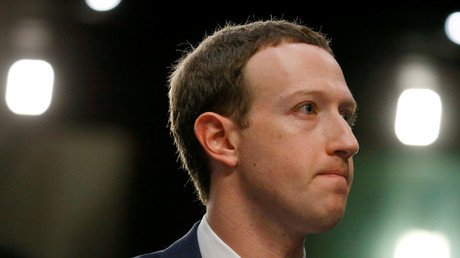More than 50 members of the US House of Representatives took turns grilling Facebook CEO Mark Zuckerberg for several hours. While he stuck to his script, here are five major things that he revealed at the hearing.
For almost five hours on Wednesday, Zuckerberg answered questions from members of the House Energy and Commerce Committee. Both parties had axes to grind: Democrats blamed Cambridge Analytica’s data harvesting for their loss in the 2016 presidential election, while Republicans mainly complained about Facebook’s censorship of conservative viewpoints.
READ MORE: Zuckerberg faces Congress for 2nd day of hearing (FULL VIDEO)
Those annoying ads? Blame Facebook, not advertisers
Throughout the hearings on Tuesday and Wednesday, Zuckerberg maintained that Facebook does not sell anyone’s data and that users can control who has access to whatever they share via “inline” settings.
Answering Rep. Joe Kennedy (D-Massachusetts) at one point, however, Zuckerberg explained that advertisers never have access to users directly. Rather, it is Facebook that places ads on users’ timelines based on its own rankings and data analysis.
“The targeting options for advertisers are generally based on what people share,” the CEO said.
We’re not listening to you (just following your every click)
Facebook is not listening in on users, Zuckerberg maintained after Rep. Larry Bucshon (R-Indiana) presented him with several personal anecdotes suggesting otherwise.
“Facebook doesn’t do this, and I’m not familiar with companies that do either,” Zuckerberg said. “We’re not collecting any information verbally,” and “don’t have anything that’s trying to listen to what’s going on in the background.”
So how were people shown ads for suits or photos of dead relatives? The CEO suggested it could be a coincidence, or that people might look these things up online after talking about them. And there, of course, Facebook tracks your every move ‒ “to make sure people aren’t abusing the service,” as Zuckerberg described it to Rep. Kurt Schrader (D-Oregon).
How much does Zuck know? Not much...
For several hours, the Facebook CEO dodged specific questions from members of the House, promising his team would get back to them with the details. With about half an hour left on the clock, Rep. Debbie Dingell (D-Michigan) called him out on it.
Zuckerberg did not know key facts, she argued: details of court cases, the fact that the Federal Trade Commission cannot issue fines, what a “shadow profile” was, how many applications need to be audited, how many other companies besides Cambridge Analytica were sold harvested data… or even what all Facebook was collecting.
How many Like buttons were on non-Facebook pages around the web? How many Share buttons? How many chunks of Facebook’s Pixel code, enabling the tracking of users all over the web? To each question, Zuckerberg could only say: “I don’t know.”
After he promised to get back to Dingell with all that information, she asked if he could do it within 72 hours, as he would be obligated to do in Europe under legislation currently in effect. Zuckerberg could only say that they would “try.”
Legion of censors
The Facebook CEO sought to deflect questions about censoring certain content on the platform by pointing out that between their thousands of content reviewers and artificial intelligence (AI) tools, Facebook is cracking down on 99 percent of terrorist (Al-Qaeda and Islamic State) content before it even shows up, and he regards that as a “model for other types of harmful content as well.”
Facebook’s counter-terrorism team has about 200 people and capacity to deal with content in 30 languages, Zuckerberg told Rep. Susan Brooks (R-Indiana).
By the end of 2018, Facebook will have 20,000 employees dealing with content review, Zuckerberg said. To put that in perspective, the company currently has 27,000 employees in total.
Censor away, but not us!
His boasts about the ability to remove content led to questions about the content that various members of Congress thought should be removed and has not been - such as content involving opioids, illegal ivory trade and sex trafficking - and why it seemed a priority to censor conservative ads and viewpoints.
Rep. Bill Johnson (R-Ohio) brought up the case of the Franciscan University of Steubenville, his constituents, who were prevented from posting an ad featuring the symbol of their order over Easter. He got Zuckerberg to admit that content reviewers can get fired over making mistakes - but the CEO did not know if the specific person who blocked the Franciscan ad has been punished.
Rep. Richard Hudson (R-North Carolina) brought up the case of Diamond and Silk, two sisters who vocally support President Donald Trump. Facebook severely restricted access to their page after deeming it “unsafe.” It was yet another “mistake” for which the company has apologized.
Diamond and Silk are “not terrorists” and their content is not “unsafe,” Zuckerberg agreed, but could not offer any specific reasons for their ban. He maintained that Facebook does not discriminate based on political viewpoints, over the objections of several Republicans who rattled off examples to the contrary.
“The question of what is hate speech and what is legitimate political speech is something we get criticism from both left and right,” Zuckerberg told Hudson. “It’s nuanced. We try to lay this out in our community standards.”
He added somewhat cryptically that “society’s sensibilities” on which those standards were presumably based were “shifting quickly.”
At one point, Rep. Billy Long (R-Missouri) had a friendly warning for the Facebook CEO.
“Congress is good at two things: Doing nothing and overreacting,” he said. “So far, we’ve done nothing on Facebook. We’re getting ready to overreact.”
Think your friends would be interested? Share this story!


